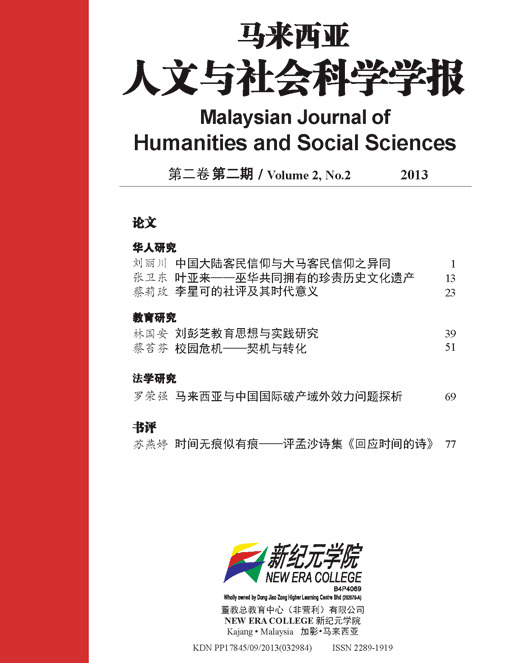中国大陆客民信仰与大马客民信仰之异同 The Differences of Folk Worship between the Hakka People in Mainland China and in Malaysia
Keywords:
客民、崇拜习俗、方言集团、马来西亚, Hakka people, folk worship, the group of dialects, MalaysiaAbstract
马来西亚客家民间崇拜习俗,主要是祖先崇拜和一般地方神明崇拜。祖先崇拜和一般地方神明崇拜,在中国,历来具有血缘性与地缘性特征。大马客家的崇拜习俗,既存在以保持宗亲、方言集团为核心的传统崇拜方式,又出现了以开放心态接纳其他方言集团进入自身祭祀圈的情况,或自身被他方言集团接纳从而进入他方言集团崇拜习俗的“变异”形式。这可以视为中国客家传统文化在东南亚地区的一种进步与发展。马来西亚客民信仰习俗的“变异”,主要是因为在举目无亲的异国他乡,为求生存和改善生活环境,主观上必须走出血缘、地缘的局限,才能汇集力量,共谋福扯,从而在客观上亦为马来西亚多元文化的健康发展做出有益贡献。
The main forms of folk worship of Malaysian Hakka are to worship ancestor and to worship localgods in general. And the same two forms of folk worship among mainland-Chinese Hakka have always had consanguinity and geographical characteristics. Traditional Malaysian Hakka folk worship is not only to maintain clans and the dialect groups, but also accept other dialect groups to join into, or they join into other dialect groups' fork worship. These changes can be considered as a sort of progress and development of Malaysian Hakka. And these changes were due to they were in foreign country alone and needed to survive and improve the living environment. They, subjectively, must be broken blood, geographical limitations, and then they could concentrate power for making better welfare. Objectively, Malaysian Hakka has made a useful contribution in Malaysian multicultural.




